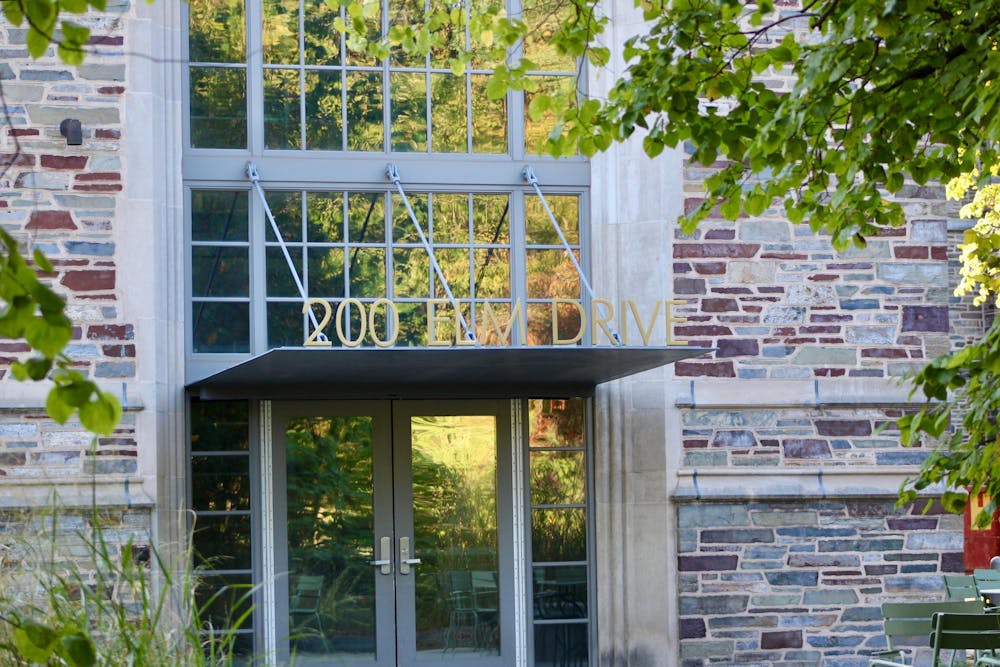Content warning: This article contains mention of sexual misconduct. University Counseling and Psychological Services are available at 609-258-3141.
This year’s annual report on security and fire safety, recently released by the Department of Public Safety (DPS), indicates that judicial referrals for liquor law violations remain at historically high levels following last year’s spike, while reports of motor vehicle thefts increased, returning nearly to numbers in 2022.
The report also shows higher numbers of sexual misconduct reports in 2024 and outlines continuing University policy updates on alcohol, drugs, and survivor support.
The report includes data from 2022, 2023, and 2024 in accordance with the federal Clery Act, which requires universities to disclose campus crime and fire safety statistics.
“The numbers, per the Uniform Crime Report and Clery data, show that the University is a safe campus,” Assistant Vice President for Public Safety Kenneth E. Strother Jr., wrote in the report. Strother also stressed the need for community vigilance and cooperation in maintaining safety.
There were 218 judicial referrals for liquor law violations in 2024, a slight decline from the 262 recorded in 2023, but still nearly quadruple the 57 in 2022. A case is considered a judicial referral when it is formally sent to a University committee for potential disciplinary action.
While last year’s surge was attributed largely to a single incident involving 176 students, the numbers in 2024 suggest that alcohol-related enforcement numbers remain elevated well above pre-2023 levels. Almost all of these violations occurred on campus, though four off-campus incidents were recorded in 2024.

In residential facilities specifically, 67 liquor law violations were reported in 2024, nearly double the 35 violations seen in 2022. Despite this, no arrests for liquor law violations were reported in 2022, 2023, or 2024.
In contrast, drug law violations remained low. No arrests nor judicial referrals were reported on campus for drug law offenses in 2024, compared to one in 2023 and four in 2022. Three additional violations were reported in non-campus properties.
The report reiterates the University’s policy that the use and possession of cannabis are prohibited on all University property and at all University-sponsored programs, despite legalization in New Jersey.
The overall number of reported criminal offenses rose slightly in 2024 relative to 2023. The report counted 60 criminal offenses in 2024, compared to 55 in the previous year.

Among these categories, motor vehicle theft once again represented the largest share of incidents once again. 47 thefts were recorded in 2024, up from 33 in 2023 but slightly below the 50 thefts reported in 2022.
The vast majority involved motorized bicycles, accounting for 35 cases, while motorized scooters were involved in eight cases and golf carts in four. DPS noted that scooters and e-bikes are classified as motor vehicles under federal definitions used for the Clery report.
In August 2023, the University announced restrictions on personal electric vehicles for the 2023–24 academic year, with an all-out ban announced in December.
Students are not prohibited from using e-bikes, but are subject to rules and restrictions guiding their use.
Notably, in the previous two reports, 36 and 34 e-scooters were stolen, respectively, with only two e-bikes stolen. This year’s report sees a flip in the ratio of e-bike to e-scooter theft, with 35 e-bikes and eight e-scooters stolen.
Instances of rape, fondling, and aggravated assault all increased in the 2024 report. Reports of burglary decreased by over 50 percent from last year’s report and was the only category that saw a lower number of offenses.
The report included four cases of stalking, two instances of domestic violence, and no dating violence in 2024. Statistics in the Clery disclosure reflect only incidents reported to University officials, not those shared in confidentiality to resources like the Sexual Harassment/Assault Advising, Resources and Education office. In 2024, confidential resources received an additional 41 reports of sexual assault, dating violence, fondling, or stalking.
The report also highlighted support for victims of sexual assault, including a policy allowing forensic evidence from incidents of sexual violence to be preserved for up to 20 years.
“Evidence can be collected and will be held for a period of 20 years to allow the victim time to decide whether to report to law enforcement,” the report stated. “An attempt will be made to contact the victim prior to the destruction of evidence.”
Compared to previous reports, the 2025 report introduced a new section detailing hazing and the University’s policies surrounding the topic. For 2022–24, the report lists hazing data as not collected; however, it mentions the requirement to collect hazing data in 2025 to be published in the 2026 report by Oct. 1, 2026.
There were two reported fires in residential facilities: one in Forbes College on Feb. 18, 2024, due to a faulty clothes dryer and one in Prospect Apartments on July 4, 2024, due to a faulty sump pump. Both incidents amounted to $3,000 in property damage combined.
Strother said that “one of our primary goals is to develop and maintain strong, lasting partnerships with our community. We call this ‘community caretaking.’” He highlighted partnerships with student groups, residential colleges, and athletic teams, as well as the use of the TigerSafe app and TigerAlert system to provide emergency notifications and resources.
The Security and Fire Safety Report is published annually by Oct. 1, as mandated by the Jeanne Clery Disclosure of Campus Security Policy and Campus Crime Statistics Act of 1990.
Hayk Yengibaryan is a head News editor, senior Sports writer, and education director for the ‘Prince.’ He is from Glendale, Calif. and typically covers breaking news and profiles. He can be reached at hy5161[at]princeton.edu.
Vincent Etherton is a head Data editor and News contributor for the ‘Prince.’
Please send any corrections to corrections[at]dailyprincetonian.com.








